| T O P I C R E V I E W |
| Jacques M. |
Posted - Feb 13 2012 : 10:54:00 AM
Hello,
A new camera here: a Fed 1a chromed.

http://www.ussrphoto.com/UserContent/1322012_1a n° 4642 001.jpg
As you can see, this camera was modified. First, a Leica lens. A small speed dial with a strange screw and a 20-1 speed (for 1/20th of a second), probably coming from a Leica III type F (or from a Fed B!). A Leica cup on the release button. And an accessory shoe which should not be here.

http://www.ussrphoto.com/UserContent/1322012_1a n° 4642 003.jpg
The description follows in the next mail: bad connexion for me here!
|
| 23 L A T E S T R E P L I E S (Newest First) |
| Jacques M. |
Posted - Feb 23 2012 : 11:17:08 AM
No revolution about this camera...
But I have just weighed the different parts and some results are curious:
For this 1a # 4642:
Baseplate only: 43g, lens only: 106g; body without baseplate: 350g.
For the 1a # 5330:
Baseplate only: 48g, lens only: 106g; body without baseplate: 366g.
I don't understand why there are such differences for the bodies...
Something else: when looking closely, the chrome appears much finer than on the other "chromed" 1a (at least those I know). So perhaps it was made at the factory, as Luiz suggests, for a special order?
I shoot some photos with it...
Amitiés. Jacques.
|
| Jacques M. |
Posted - Feb 17 2012 : 05:00:32 AM
Now, about that famous speed dial.
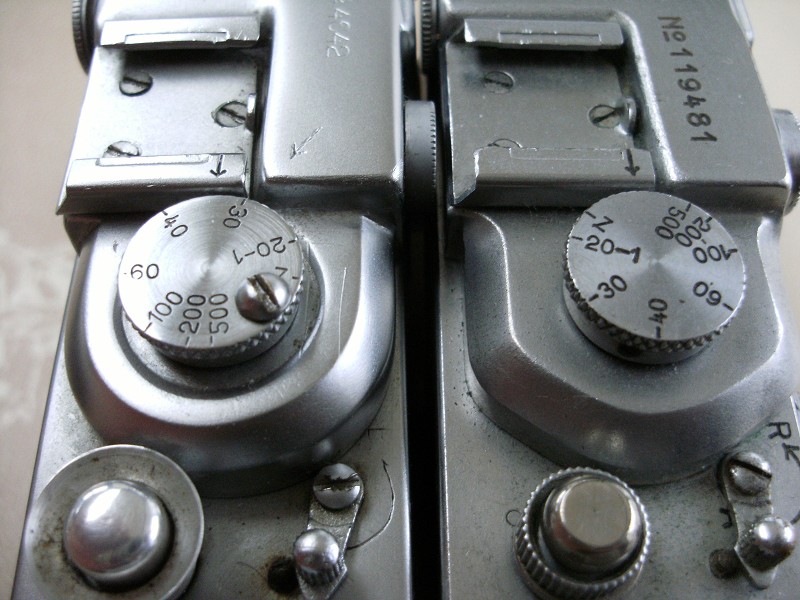
http://www.ussrphoto.com/UserContent/1722012_1a 005.jpg
On this first picture, the dials of the IIIa and of the Fed 1a (#4642) with its screw. The diameters are exactly the same (13mm).
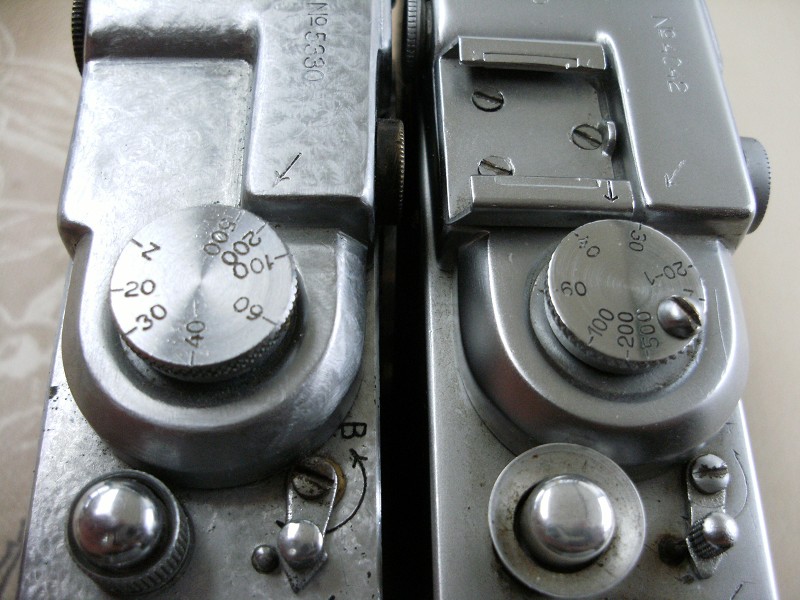
http://www.ussrphoto.com/UserContent/1722012_1a 006.jpg
Here, you have the dials of the 1a # 5330 with the 1a # 4642. That time, the diameters are different: 15mm for the 1a (like any original 1932 Leica II). But later Leicas II will have a 13mm dial too, because of standardization of the production with the IIIa.
So, I think that the speed dial comes from a Leica model F (or IIIa), or a later Leica II (from 1934, if I remember).
If I sum up: speed dial, tip of rangefinder, shutter box coming from early Leicas; cover, two plates and belt from the original Fed 1a.
The question of the lens is unsolved.
As for the inside of the cover, I agree with Luiz: there must be Leica parts for the rangefinder. But I don't want to dismount: I fear scratches on the beautiful chrome as I don't have the correct tools.
Always about the rangefinder, the contrast is very dim. But it seems correctly regulated. I will say more after some photos!
Amitiés. Jacques.
|
| Jacques M. |
Posted - Feb 17 2012 : 04:35:59 AM
Hi Luiz! (and all friends...)
I have taken some more pictures to enlighten the discussion (if possible!).
First, the rectangular window, the "scale" window.
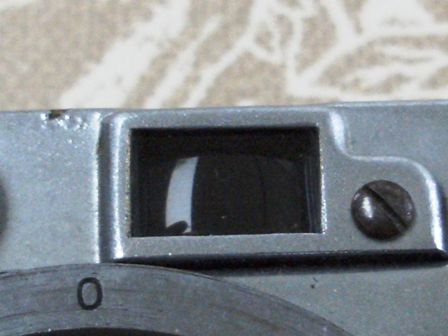
http://www.ussrphoto.com/UserContent/1722012_1a 001 F.jpg
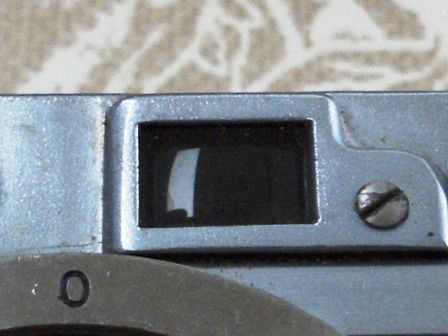
http://www.ussrphoto.com/UserContent/1722012_1a 002 D.jpg
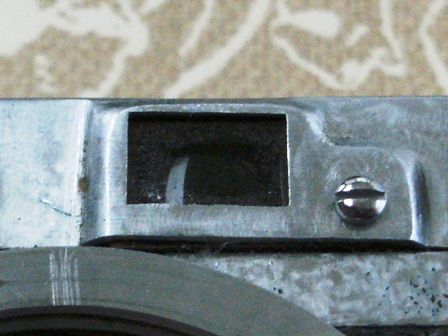
http://www.ussrphoto.com/UserContent/1722012_1a 003 5330.jpg
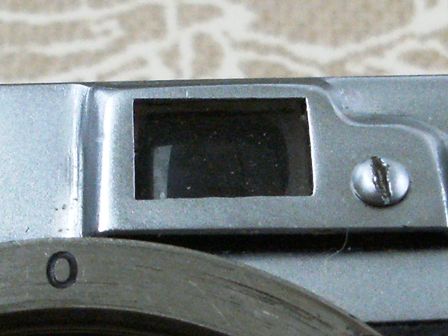
http://www.ussrphoto.com/UserContent/1722012_1a 004.jpg
From the top: 1933 Leica F (IIIa), 1932 Leica D (II), 1935 Fed 1a # 5330, 1935 Fed 1a # 4642 (the one in question).
We can see that the metallurgy of the Leicas is different: the corners are neater and more square.
As for the measurements, in millimeters (glass only):
- 10x6,5 (Leica IIIa),
- 9,5x6 (Leica II),
- 9x6 (the two 1a-s).
By the metallurgy and these measurements, I think that the cover of this 1a # 4642 is really a Fed one.
|
| Luiz Paracampo |
Posted - Feb 16 2012 : 1:36:10 PM
Jacques
Really the hypotesis of a Leica IIIa should be considered ... But IIIa dials are smaller!
Please take a paquimeter and compare view finder window
also the external rangefinder prism seems to be came from Leica.. If not why the round wheel on the RF sensor?
Several Mysteris in a single camera!
LP |
| Jacques M. |
Posted - Feb 15 2012 : 4:13:59 PM
Really many thanks for your congratulations and your posts, Luiz!
Concerning the top plate, I really think it's a Fed production. The windows have exactly the same shape and size as on my regular Fed 1a. The entire body comes from Fed, I think. There are some very tiny traces around the four front screws: probably the Leica shutter cage was some tens of millimeters out of the original Fed holes. These traces were made a long time ago and cannot be easily seen.
About the speed dial, I think it comes from a Leica III, model F (other name is IIIa, but not IIIf!). This III model F had the 1/500th only, the "Z" position and was the first Leica to have slow speeds. It was made from 1933, just after the II (model D, 1932). I agree with you about the screw: certainly it was put in connection with the accessory shoe. Your hypothesis of a flash is perfect!
As for the lens, certainly it's a mystery. I thought it was a regular Elmar, which is not, because of the position of the diaphragm. You know much more than me about lenses, so, tell me what I have to look for...
As soon as I can, I put a film to take pictures. A way to have some answers!
Amitiés. Jacques. |
| Luiz Paracampo |
Posted - Feb 15 2012 : 2:45:37 PM
The uncoated lens is an other Mystery It could be a monoblock from early Kine Exaktas or Industar 10 refitted in the barrel.
Industars 10 have smaller diameter requiring a new external ring which is not the case, but early Industar 22 were also uncoated. and very similar in diameter but needed a longer tube 
Things must be checked.
Regards
LP |
| Luiz Paracampo |
Posted - Feb 15 2012 : 2:36:36 PM
My people!
Really an odd example... and made by a very skilful technician. pehaps in the factory.
According to the sent pictures I can say that not only the complete crate is from pre-war Leica II but also the top plate , rangefinder and viewfinder (windows are slightly greater than FEDs).
Advance and rewind knobs came from FED, but release collar pehaps came from Leica. The speed dial tube of Leicas are threaded and can receive dials from later types and could be machined to receive FED dials... BUT!!!! in this case the dial is a mistery: It certainly did not came from a IIIf (because the Z) all IIIf have "B" intead. (The 20-1 is Ok but lacks the 1000!) and the speed dial has apparently the same size and engravings of the early FEDs. in this case the dial is a mistery: It certainly did not came from a IIIf (because the Z) all IIIf have "B" intead. (The 20-1 is Ok but lacks the 1000!) and the speed dial has apparently the same size and engravings of the early FEDs.
So, why not a prototype made for hobby?
According to my point of view, in order to accomodate the new optical system from Leica the top cover was machined and RECHROMED!at the original factory standards.
About the external screw... The position is suspicious! When the camera is cocked in 20 and fired its position comes near the shoe.. This indicates a flash synchonizing device, when it hits a micro switch put as an accessory.
Jacques ! my congratulations for the achievement!
LP
|
| Jacques M. |
Posted - Feb 15 2012 : 11:38:20 AM
Not impossible, Juhani. But a Fed lens would probably have been put, I think...
About the lens, I am a bit confused. Elmars have a diaphragm just behind the front lens. Tessars, like Fed lenses and Industar 22 have their diaphragm in the middle of the optical block.
And this "Leica" lens has a Tessar like diaphragm.
And there is no doubt about the barrel. The different inscriptions belong to a standard Leica lens, including the "R" for infra red which appeared in 1935. So I wonder if it is possible to put a Fed optical block into a Leica barrel...
Do you have an idea?
Really, this camera is much more exciting than a 1932 brand new Leica II !  At least for me! At least for me!
Amitiés. Jacques. |
| cedricfan |
Posted - Feb 15 2012 : 08:07:06 AM
Or is it a Leica that was hidden inside FED shell when WWII started and a Leica would not have been a welcomed sight in USSR?
Best regards,
Juhani |
| Jacques M. |
Posted - Feb 15 2012 : 03:07:44 AM
I think all that souds logical: a 1932 Leica II repaired with 1935 Fed parts, rather than the reverse. And the screw is there to change speeds quickly: I had not thought of that possibility.
Anyway, the repair was very serious, as the shell of the 1a only remains, with the two plates, the cover and the buttons. All the rest (mechanism, optics and tip of rangefinder) belongs to a Leica. I have not yet dismounted the cover to see what is hidden inside: Fed or Leica parts? 
Amitiés. Jacques.
|
| uwittehh |
Posted - Feb 14 2012 : 4:53:52 PM
Vlad,
I agree to you, the screw on the speed dial was inserted to change the speeds quickly without looking on the dial.
Ulrich
http://fotos.cconin.de |
| uwittehh |
Posted - Feb 14 2012 : 4:50:35 PM
Vlad and Jacques,
what about the other way? It's a Leica that somebody in the former USSR has had and that was repaired with FED 1a parts because it's falling on the ground and the body shell and top cover was broken? :-)
Ulrich
http://fotos.cconin.de |
| Vlad |
Posted - Feb 14 2012 : 4:37:08 PM
Jacques, I'm pretty sure the screw on the speed dial is for changing speeds without looking. My guess is it may have been a photo-reporter's camera. The photographer would need to change speeds quickly to fire off a few shots with rapidly changing lighting condition, so they may not want to take the camera off their face so he would "feel" the shutter speed with that screw there. The fact that the camera had been so lovingly repaired multiple times especially with expensive Leica parts may indicate that it was in fact heavily used camera for work.
Cheers,
Vlad. |
| Jacques M. |
Posted - Feb 14 2012 : 3:52:14 PM
To Vlad:
Probably you are right. The story of a Fed repaired with Leica parts in the thirties appears too beautiful!
The question of this screw (on the shutter dial) puzzles me. Why such a screw there? I have dismounted it, and there is nothing below: it is connected nowhere.
Can we imagine that its head could be in relation to the accessory shoe, which should not be there either?
I think of some accessories like Leica lightmeter, for example...
But certainly, there could be other explanations...
Amitiés. Jacques. |
| Jacques M. |
Posted - Feb 14 2012 : 3:42:33 PM
quote:
Originally posted by cedricfan
What I can read from "1200 cameras" is that #4643 was last one with straight text on top and is from 1935. There is also a term "kod zink" which I would say means "galvanized" insted of chrome like yours. From #4650 on top is chrome and text tilted (cursive?)
Thanks, Juhani.
But I don't really understand the "1200 cameras".
If from # 4650, there is only chrome, I think it is not a problem to find a # 4642 (my modified 1a) with chrome as a forerunner.
But on the other hand, there are "galvanized" ones well after these numbers: my regular # 5330, for example. And italic letters were only used from c. 6000 with YCCP inscription.
Till now, I thought that there were galvanized 1a when the Commune had not enough chrome. Hence the apparition sometimes of "chromed", sometimes of "galvanized". At the end of the 1a-s, chromed ones become "regular" from # c.5800.
Am I wrong?
Of course, I don't speak of very early 1a-s. These ones are well described in Aidas's site (and I will never have one of them in hand!).
Anyway, it's a pity that "1200 cameras" is not translated... And it is difficult to establish rules when cameras are rare...
Amitiés. Jacques. |
| uwittehh |
Posted - Feb 14 2012 : 1:11:41 PM
Jacques,
really a great find! I agree that it could be a camera that was made by repair with mixed Leica and FED parts.
Ulrich
http://fotos.cconin.de |
| cedricfan |
Posted - Feb 14 2012 : 11:17:14 AM
What I can read from "1200 cameras" is that #4643 was last one with straight text on top and is from 1935. There is also a term "kod zink" which I would say means "galvanized" insted of chrome like yours. From #4650 on top is chrome and text tilted (cursive?)
Best regards,
Juhani |
| Vlad |
Posted - Feb 14 2012 : 11:16:15 AM
Jacques, an astonishing example! I may argue though with your theory, that the repair may have been done in the post-war years, the added screws look somewhat modern (post-war) to me, especially the one on the speed dial, I remember this kind of screws from before, on Soviet electrics circa 1950s to late 60s. There were probably also a lot more Leica parts available freely much later, I can't imagine having Leica parts laying around in pre-war years, those were worth their weight in gold in Soviet Union and normally a Leica would be fixed first before the FED.. this most likely is a repair job from 50s or 60s..
Cheers,
Vlad |
| Jacques M. |
Posted - Feb 14 2012 : 10:21:24 AM
So, here is how I see the story 
This camera has a shutter problem. The owner can have Leica parts and he decides to use them instead of resending the camera to the factory. We know (by the odd 1b serial numbers) that it was common for the early 1a. The four front screws have very old marks of dismounting, so I think the job was done very early (in the thirties?).
Another track is the standardization. With the work which was done, the owner could have the first standardized Fed in the world! It could be interesting to use Leica lenses: before 1938, there was only the Fed 3,5/50mm on the Russian market. It could be interesting to use Leica lenses: before 1938, there was only the Fed 3,5/50mm on the Russian market.
But all that is only hypothesis... which need a discussion!
Amitiés. Jacques. |
| Jacques M. |
Posted - Feb 14 2012 : 09:59:41 AM
Now, the lens.

http://www.ussrphoto.com/UserContent/1422012_1a n° 4642 004.jpg
It's an Elmar without number, so made before 1932 and adapted to A or C Leica models. Most of these lenses were standardized afterwards. It seems the case of this one: the "0" denotes it.

http://www.ussrphoto.com/UserContent/1422012_1a n° 4642 006.jpg
This lens is too an export one, as the scale is in feet.
The body too was adapted. The flange is marked with a "0" too, which is the distinctive sign for a standardized body. To be complete, one can see the cylindric tip of rangefinder on the photo below.

http://www.ussrphoto.com/UserContent/1422012_1a n° 4642 007.jpg
|
| Jacques M. |
Posted - Feb 14 2012 : 04:26:01 AM
Hi Juhani,
What would you say about exceptions in French! 
The numberings about machined/chromed 1a is obscure, at least for me.
It seems there is a "concentration" of chromed one from # 5800 (yours and Ulrich's, for example). Before, we would see mainly machined ones. But there are exceptions: I remember having seen several ones before, for example the # 4928 that I had in my hands (owner: PYC, a French collector).
Do you have datas about that question?
Are there precisions in "1200 Cameras..."? The JLP is not clear...
Amitiés. Jacques.
Just a photo more for the cover:

http://www.ussrphoto.com/UserContent/1422012_1a n° 4642 002.jpg
|
| cedricfan |
Posted - Feb 13 2012 : 2:11:04 PM
quote:
Originally posted by Jacques M.
The serial number is 4642: Aidas's 1a follows in the wiki with his 4643. Two consecutive numbers: astonishing! But mine is chromed, Aidas's is machined.
Also astonishing that a later serial is machined! Chrome did not replace machined, but there is a shift period when both finishes were used. So nothing can be taken as granted, there is always exceptions to every rule. Like German language grammar 
Best regards,
Juhani |
| Jacques M. |
Posted - Feb 13 2012 : 11:28:27 AM
The serial number is 4642: Aidas's 1a follows in the wiki with his 4643. Two consecutive numbers: astonishing! But mine is chromed, Aidas's is machined.
http://www.ussrphoto.com/Wiki/default.asp?WikiCatID=98&ParentID=1&ContentID=87&Item=FED+1a
When examining the inside, there are some mportant modifications too. The tip of the rangefinder is a Leica type: round cylinder. And what appears when removing the bottom plate shows that there is a Leica shutter box which was adapted.

http://www.ussrphoto.com/UserContent/1322012_1a n° 4642 013.jpg
On the left of the picture, the bottom of this 4642 Fed. On the right, my regular 5330 1a. The "lock" is screwed on the 4642 (like on all the Leicas), riveted on the 5330 (like on the Feds). And the bottom screw, which tightens the shutter box and the body, cannot be placed, as the two holes are displaced:

http://www.ussrphoto.com/UserContent/1322012_1a n° 4642 016.jpg
So, this beautiful Fed 1a has the "motor" of an early Leica (anyway not after 1933) and several visible parts coming too from Leitz.
We can suppose that this Fed 1a had a shutter problem, which was not rare with these early 1a. And the owner had it repaired with Leica parts, rather than resend it to the factory.
The next message about the lens! 
|
|
|
